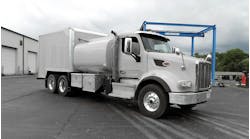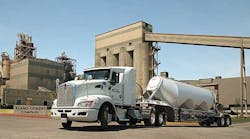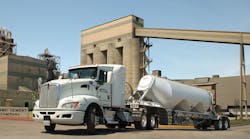One hundred years. That is a long time for any trucking company to be in business, and it is an even rarer milestone for a US tank truck carrier that is still family owned and managed.
In fact, it would appear that Schwerman Trucking Company has the distinction of being the first US tank truck carrier to reach the century mark. It is certainly the largest family-owned US tank truck fleet to turn 100 years old. The carrier will celebrate its hundredth anniversary in June.
“Someone had to be first, and we're thrilled that it was us,” says Jack F Schwerman, president of Tankstar USA Inc, the holding company that includes Schwerman Trucking. “We've always told our employees that years in business is the acid test for any company. It is the true indication of a well-managed company.
“You have to change with the market or you will be left out in the cold. Many tank truck fleets went by the wayside because they wouldn't change. It hasn't been easy at times, but we did successfully adapt as this industry evolved, and we continue to do so today.
“We're going to be around for many years to come. We believe we are well positioned for the future, and our operations are geographically and product diverse. This is still a family-owned company, and we are now into the fourth generation. Our headquarters facility in Milwaukee (Wisconsin) is right across the street from where this company started.”
Centennial Celebration
The Centennial Celebration started with publication of a 2013 calendar showing the trucks used by the fleet over 10 decades. The company will be holding a Celebration Weekend in June that will include an open house at the Milwaukee corporate office and various events for customers and company employees.
“We're holding employee appreciation events at our terminals through the year that will tie in to the Centennial Celebration,” Schwerman says. “Every employee is getting a set of drink glasses with the 100th anniversary logo new trucks and trailers. We gave out 100th anniversary shirts to all Schwerman employees last year.”
Schwerman Trucking is the largest of the carriers that make up Tankstar USA, which was ranked fourteenth in the most recent Bulk Transporter Gross Revenue Report with 2011 revenues of $125.5 million. The Tankstar USA group includes Bulk Logistics, North American Bulk Transport Inc, and Rogers Cartage Company.
“While Schwerman Trucking is the oldest of the group, it's not alone in celebrating significant milestones this year,” Schwerman says. “Rogers Cartage is 80 years old this year, and North American Bulk Transport is 60 years old.”
The combined Tankstar USA organization runs approximately 650 tractors and 1,800 trailers and operates out of roughly 30 terminals (16 of which are under the Schwerman Trucking banner). Cargoes range from cement to chemicals, and the business is split fairly evenly between liquids and dry bulk.
Hard work
Getting to where it is today was never a given for the tank truck carrier and the family that founded it. It was a process that took a lot of hard work, sweat, and even a few tears.
Schwerman Trucking got its start in Milwaukee as Fred Schwerman Motor Trucking in 1913. Fred Schwerman Sr (Jack Schwerman's grandfather) began with two trucks — one of which was a Titan — that were used to haul farm products. Working closely alongside Fred Schwerman Sr through the early years were his wife Ruth and their sons--Fred, Richard, and Carl.
It wasn't long before Fred Schwerman Sr decided there were better opportunities in construction hauling. The company switched to dump trucks and went to work on construction projects throughout the area.
The growing trucking company hit its first significant bump in the road during the Depression years in the 1930s. At one point, the carrier had to abandon a truck on the side of the road after it ran out of fuel. There simply wasn't enough cash on hand to pay for the fuel.
However, Schwerman Trucking made it through that challenging time and grew steadily through the World War II years. This was also a time of change for the company.
Change and innovation
After Fred Schwerman Sr suffered a heart attack, his son (and Jack's father) Fred took on a more active role in managing the fleet operations. “My father had been drafted into the US Army, and then my grandfather had his heart attack,” Jack Schwerman says. “He spent just one day in the Army before being released, because Schwerman Trucking was hauling bomb casings 24/7, which was a critical war activity.”
Despite the war-related operations, Fred Schwerman Jr found time to explore better ways to haul various cargoes. One project was the stainless steel screw-auger trailer that he designed for bulk shipments of brewery malt.
“Prior to that development, brewery malt was transported in dump trucks, and this was really a revolutionary development,” Jack Schwerman says. “This was the first dry bulk trailer.”
In the post war years, Schwerman Trucking became one of the pioneers in hauling bulk cement. “Until that time, the railroads handled all of the bulk cement movements,” Jack Schwerman says. “My father was one of the first in the trucking industry to sell cement companies on the benefits of bulk cement shipments. He used the screw-auger trailer to demonstrate his ability to haul bulk cement. Unfortunately, the test didn't go as planned, and he had to shovel off the load.”
A redesign worked out the bugs, the auger trailer became the standard for hauling bulk cement for many years. The screw-auger trailer remained popular until the first pneumatic bulker was introduced around 1959.
“The screw-auger trailer caught on quickly with the cement industry and other carriers, and Trailmobile built a lot of them,” Jack Schwerman says. “Unfortunately, my father never patented the design.”
Golden years
Schwerman Trucking entered its greatest period of sustained growth during the 1950s. Construction activity surged in the post-WWII period, and the biggest project of all was the development of the Interstate Highway System that grew out of the Federal Highway Act signed into law in 1956 by President Dwight D Eisenhower.
There was plenty of work for the carriers, like Schwerman Trucking, that had authority under the Interstate Commerce Commission to haul cement. Until 1975, regulated carriers hauled more than 99% of the cement.
The 1950s saw Schwerman Trucking expand beyond its Wisconsin base, setting up terminals throughout the eastern half of the United States. The carrier opened its first terminal outside Wisconsin in Fairbourne, Ohio, in 1951. That was quickly followed by terminals in Greencastle, Indiana, and Pittsburg, Pennsylvania.
As the carrier grew, Fred Schwerman was willing to haul anything he could put into a dry bulker or tank trailer. He once said he would haul anything that could be unloaded through a hose. In addition to cargoes such as cement, foundry sand, and flour, the Carrier hauled bottle caps in a dry bulk trailer fitted with a vibrating conveyor belt.
In an effort to counter the seasonality of cement hauling, Schwerman Trucking expanded into liquid cargoes. The company started with asphalt and gasoline in Wisconsin.
Chemical expansion
In 1965, the carrier made its biggest expansion move to date, purchasing Petroleum Carrier Corporation (PCC) in Jacksonville, Florida. PCC specialized in transporting chemicals and petro-chemicals.
Frustrated with the challenges of raising capital through banks for further acquisitions, Fred Schwerman took the company public in 1965. The company successfully sold non-voting shares and raised substantial funds for future acquisitions.
Steady growth continued through the 1960s and 1970s. By 1978, Schwerman Trucking was ranked the third largest US tank truck carrier in Modern Bulk Transporter's Annual Gross Revenue Report. Fleet size had reached 1,300 tractors.
Jack Schwerman grew up in the company during those golden years, and he learned the operation from the ground up. His father pushed him hard while he was learning the ropes. Jack Schwerman recalls one cold winter day at the Milwaukee terminal. He had worked in the maintenance shop all day, and by late afternoon as the light was fading he was chilled to the bone, tired, and hungry.
“I went to the main office and knocked until my father opened the door,” he says. “I told him I was hungry and wanted to go home. In the car on the way home, he turned to me and said: ‘you have to make up your mind whether you want to do what it takes to succeed in this business.’ I couldn't bring myself to tell him that it had nothing to do with working hard or wanting to succeed. I was just cold, tired, and hungry.
“My father was tough, stubborn, and very hands on. At the same time, he was willing to listen when someone had an idea for doing things a better way.”
Changing market
Despite the continued growth, Schwerman Trucking was buffeted by the winds of change. The first significant change came in 1975 when cement hauling was opened up to customer pickup and more competition.
“Prior to the lawsuit that gave carriers the opportunity to contract with ready mix plants, each cement producer typically worked with a single carrier,” Jack Schwerman says. “With the beginning of customer pickup, many established cement haulers exited the business. We stayed with it, and it is still a big part of our operation.”
In 1980, the United States went into a deep recession, and the economy slowed significantly. High interest rates added to the pain. The rate for the company's revolving credit line provided by five banks went to four points over prime, roughly 20% at the time. In 1981, the company paid $4.5 million in interest.
As part of a failed effort to revive the economy, President Jimmy Carter deregulated a number of industries, including trucking. Suddenly, the Interstate Commerce Commission no longer approved rates or restricted access to the trucking industry.
Dire straits
The stress of the financial issues took a toll on Fred Schwerman, who died in 1982.
At age 29, Jack Schwerman became the man in charge. He had been part of management team at Schwerman Trucking's fast-growing Texas operations since 1978.
He faced a dire situation when he returned to Milwaukee. Shutdown of the company was a distinct possibility. Jack and his uncle, Carl Schwerman, immediately formed a committee to look for ways to salvage the company. At a meeting with the company's bankers, they unveiled a plan to aggressively pay down debt by November 1982.
“Like so many trucking company owners during the early days of the industry, my father was a seat-of-the-pants operator,” Jack Schwerman says. “If you had money in the bank at the end of the year, you were successful. Unfortunately, that was no longer enough to keep the company in business.
“We had to be ruthless, and we were. We had 300 trucks parked when my father died. We became used truck salesmen, and we sold off everything we could. We sold our heavy-haul division in Green Bay (Wisconsin). We sold two tank storage terminals.”
Terminal closings
Eight terminals were closed as part of the debt reduction effort. “We had no choice,” Jack Schwerman says. “We had to get rid of any terminal or operation that wasn't profitable. We started working our way through the list of terminals. We were all union at the time, and the drivers at the first eight terminals on the list would not negotiate new contracts, and we closed those locations. The ninth terminal on the list (Greencastle, Indiana) agreed to a contract restructuring, as did the rest of the terminals.”
Schwerman Trucking sold off its truck and trailer leasing subsidiary, STC Leasing, which had seven locations. “We had to sell it, because we had a big bank payment coming due,” Jack Schwerman says. “We would have had to shut down if we couldn't sell the leasing operation. Fortunately, Ruan stepped in and bought the whole leasing operation.”
Help also came from other quarters. First Wisconsin National Bank (now US Bank) bought up the loans from the other four lenders. Fruehauf Trailer was Schwerman Trucking's largest creditor, and the tank trailer builder helped a lot by easing payments. The trucking company's survival was in Fruehauf's best interest, because the carrier's orders represented about two years of Fruehauf's tank production.
Ford Motor Credit was Schwerman Trucking's second largest creditor, and the Ford advisor gave Jack Schwerman some of the best advice: Communicate and keep your promises. Don't hide from your creditors and don't hide your problems from them. Always pay your bills.
Schwerman Trucking's management team was overhauled, and Dan Bulinski came on board as chief financial officer. He introduced zero-based budgeting that was applied terminal by terminal. “It took a couple of years to make all of the financial changes, but we got to know our costs very well,” Jack Schwerman says. “The process is still in place, and we review every terminal's performance monthly.”
An equipment auction in Milwaukee in October 1982 brought in more revenue than expected. By the time the downsizing was complete, Schwerman Trucking had fallen from the $100 million carrier it was in 1978 to one that was valued at around $55 million.
Successful turnaround
Slowly but surely, Schwerman Trucking turned the corner and returned to profitability. The leaner and more competitive carrier began growing again and was back on the hunt for acquisitions. “In 1986, we bought C T Hertsch, which was renamed North American Bulk Transport,” Jack Schwerman says. “Most of our acquisitions have continued to operate under their own names because they are well known in their own markets.”
Schwerman Trucking principles started a holding company in 1987 to provide cost savings through centralized corporate office processes for each of the individual carrier subsidiaries. Jack Schwerman's daughter, Stacey (now director of pricing and one of three fourth-generation members of the Schwerman family to join the company) later came up with the Tankstar USA name.
By 1990, Jack Schwerman decided the time was right to return the company to its roots as a family-owned operation. He led a majority share repurchase that bought back all of the preferred shares.
As the 1990s opened, the management team realized the company needed to grow in chemical hauling or get out. The decision was to become a bigger player in chemicals, and Rogers Cartage was purchased in 1998 as part of that effort. The last fleet acquisition was in 2008, a dry bulk carrier that was rolled into North American Bulk.
Even before that acquisition took place, the Tankstar USA management team knew economic challenges were coming. “In late 2006 and early 2007, we could see the beginnings of the recession,” Jack Schwerman says. “Business dropped rapidly in 2009, but we were prepared. We learned during our 1980s struggle for survival how to tighten up quickly. We sold off our oldest tractors and management took a 10% wage cut.”
Even as it pursues new growth opportunities now, management is keeping a close watch on equipment utilization. Most new equipment purchases are for replacement only, but management believes the company is well-positioned for the future.
Liquid and dry
Today, Tankstar USA is split roughly 50-50 between liquid cargoes and dry bulk. Cement still plays a big role, as it has throughout the Schwerman Trucking history. “We succeeded in cement hauling where many others didn't,” Jack Schwerman says. “We were innovative and we worked hard.”
In addition to cement, the carrier hauls fly ash, sand, and lime. Construction activity is growing, especially in areas such as Washington DC, but the carrier also hauls a lot of cement and other construction materials for soil stabilization and oilfield work.
Chemical hauling has remained steady. Chemical plant closings during the recession meant products had to be shipped from other locations, and that created more loads for Schwerman Trucking and the other Tankstar USA fleets.
Equipment has been specified to handle the various cargoes as efficiently and safely as possible. Recent tractor purchases have included Freightliner, Volvo, and Kenworth units — all with proprietary engines in the 425- to 450-horsepower range. Since 2009, the carrier has been specing tractors with roll stability (Bendix and Meritor) and automated transmissions. The carrier runs sleeper and daycab units, and the sleeper tractors have Thermo King auxiliary power units.
Last year, the tractor specs were updated to include several features designed to improve safe operation and reduce driver stress. New tractors are being equipped with hands-free cell phone systems, collision avoidance technology, and disc brakes in all wheel positions.
Starting this year, Tankstar USA will begin retrofitting its entire fleet with air-thru axles, and tire pressure monitoring systems (TPMS) are being ordered on all new tractors. “Over the next three years, we will invest almost $2 million to put TPMS on all of our tractors and air-thru axle systems on more than 1,500 trailers,” Jack Schwerman says.
Tractors used on the dry bulk side have Gardner Denver blowers for product handling. Chemical fleet tractors have Roper product pumps. Product hoses are supplied by Hart Industries Inc.
Trailer fleet
The newest dry bulk trailers in the fleet were supplied by Heil Trailer International and Polar Tank Trailer Inc. Dry bulkers in some locations have spreader bars for use in soil stabilization applications. In 2009, the company began a shift to widebase tires, and all of those trailers have been outfitted with WABCO IVTM tire pressure monitoring systems.
The company has more than 100 horizontal storage bins for cement that are leased to construction companies for large projects such as road paving, bridge building, and oilfield operations. “We recently purchased our first vertical silo and are looking to expand transload operations at various locations,” Jack Schwerman says.
On the chemical side, the newest tank trailers were built by Polar and Brenner Tank Inc. The standard trailer is built to DOT407 requirements and has a 7,000-gallon capacity. The carrier runs straight-barrel and double-conical units. The fleet includes some multi-compartment trailers and some acid units.
Managing the growing operation demands real-time data, and a lot of it. The company began using the PeopleNet in 2004 to communicate with drivers and track fleet activity. Electronic driver logging was rolled out during 2005 and 2006.
The company purchased the TMW dispatch system and TMW's TMT Transman maintenance management system in 2007. “We have fully integrated the PeopleNet on-board computers with the TMW system, greatly reducing driver paperwork,” Jack Schwerman says.
The Pegasus Transflo imaging system has reduced paper handling requirements to complete billing and expedite invoices to just 24 hours in most cases. The process used to take five to seven days. The system also is being used to manage hiring, human resources, and maintenance documents and forms. The carrier recently tapped PeopleNet subsidiary Vusion to handle fuel tax reporting.
“As a side benefit, we gained an enhanced view of how our fuel is being consumed,” Jack Schwerman says. “We're now looking improved ways to capture electronic driver vehicle inspection reports.
“All of this technology has made us a better partner with our customers and a much stronger competitor in the tank truck market,” Jack Schwerman says. “We evolved from a company with unsophisticated systems to one with some of the latest cutting-edge management technology.”
Going forward
Technology was a tool that helped Schwerman Trucking succeed over the past 100 years, but it was just a tool, according to Jack Schwerman. It was the people who worked for Schwerman Trucking over those many decades who gave the company its character. Great leadership and great employees built the company.
That team of people will enable the company to continue thriving in coming years. “This company has a great future in tank trucking,” says Jack Schwerman, who still has his commercial driver license. “While we will adapt to market changes by offering new services, we plan to always be a tank truck carrier. This company is not for sale. We are, instead, looking for acquisitions that with the potential for strategic growth opportunities.”
Most importantly, Schwerman Trucking, along with the other Tankstar USA holdings, will remain family owned. Three generations of the Schwerman family led the company through the first 100 years, and the fourth generation is coming on board. Jack Schwerman's children who have joined the family include — Stacey, director of pricing at Tankstar USA; Kelley Leibham, accounting department; and David, Schwerman Trucking terminal operations in San Antonio, Texas. n










